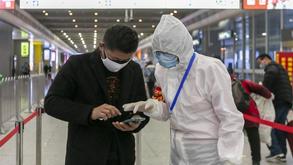 A volunteer helps a passenger register for his health information at Shanghai Hongqiao Railway Station in Shanghai, east China, March 5, 2020. (WANG XIANG / XINHUA)
A volunteer helps a passenger register for his health information at Shanghai Hongqiao Railway Station in Shanghai, east China, March 5, 2020. (WANG XIANG / XINHUA)
China's civil aviation authority is stepping up measures to prevent novel coronavirus cases from being imported from other virus-hit nations via international flights, as the outbreak slows within the country but picks up speed across the world.
Airlines should minimize cabin service and ramp up protection efforts for all crew members during high-risk flights
The Civil Aviation Administration of China will work with the departments of foreign affairs, customs, public security, health and immigration, as well as the Beijing municipal government to strengthen the management of international flights, Zhu Tao, chief of the CAAC's flight standard department, said on Thursday.
Airlines are urged to enhance disinfection and ventilation to ensure safe travel for passengers, he said.
READ MORE: Imported illness a growing problem
The CAAC requires carriers to take the temperature of each passenger and set up an emergency quarantine zone onboard. Wearing face masks is also a must, Zhu said.
Airlines should minimize cabin service and ramp up protection efforts for all crew members during high-risk flights. They should immediately take isolation, ventilation and sterilization measures when suspected cases are found on planes and inform the destination airport, he added.
In the face of challenges from imported cases, the Beijing Capital International Airport has designated Zone D of Terminal 3 as a special zone for inbound flights from countries with serious coronavirus situations, according to Zhu.
ALSO READ: Imported cases rise as virus basically contained
All passengers disembarking from such flights need to complete a monitoring process, including body temperature screening and information inspection within the area, he said.
Zhu also noted that the CAAC has provided guidelines for epidemic prevention and control to aviation authorities and airlines in South Korea, Japan, Iran and other countries for their reference.
Moreover, discussions with the International Civil Aviation Organization to push forward unified technical standards for epidemic prevention have begun, he added.


